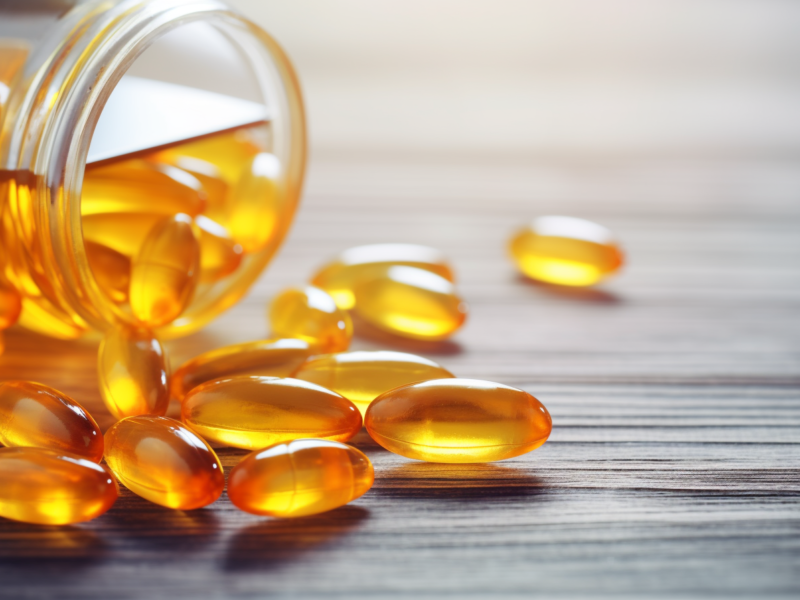Introduction to Fish Oil and Omega-3s
Let me introduce you to a couple of little gems—Fish Oil and Omega-3s. They’re the bee’s knees when it comes to their health benefits. You see, fish oil isn’t a load of codswallop; it’s packed to the gills with a type of fat that’s pure gold for your body—omega-3 fatty acids, found plentifully in fatty fish like salmon. Now, some may say, ‘Hold on a minute, isn’t fat a bad thing?’ Well, not all fats wear the black hat. Omega-3s are essential fatty acids, the good guys, necessary for supporting heart health, eye health, and even managing inflammation. But if you’re not much for fileting or flipping fish, no need to fall hook, line, and sinker for the myth that you can only get omega-3s from seafood cooks.
In fact, here are other sources:
• Omega-3 supplements, including fish oil supplement and omega-3 supplement
• Nuts and seeds, like walnut and flaxseed
• Marine foods like krill oil and algal oil
• Plant-based oils, such as canola oil
Playing second fiddle to no one, Omega-3 fats are divided into three main types: ALA, EPA, and DHA. EPA and DHA are long-chain omega-3 fatty acids, primarily found in cold-water fish like salmon, while ALA is a short-chain omega-3 fish found in plant-based foods like flaxseed and walnut. When you tuck into your hearty salmon or pop a fish oil capsule, your body gets a dose of EPA and DHA omega-3s that some folks swear by for staving off heart disease among other potential health benefits. And if you think fish oil supplements taste like you’re French-kissing Nemo, fear not! Fresh fish oil or high-quality supplements don’t have that rancid fish oil taste that makes you feel you’re gnawing on bait. But as useful as these supplements are, don’t go overboard. It’s prudent to discuss the intake of omega-3 and fish oil supplementation with a healthcare professional to make sure you’re consuming omega-3 doses greater than 2000 mg safely.
Myth 1: Fish Oil Supplements Always Taste Like Fish
Well, ain’t this just the cat’s pajamas! We’re about to bust one of the most common myths about omega-3: that thing about all fish oil supplements tasting like old Salty Sam’s bait bucket. Now this might come as a surprise, but believe it or not, that’s not always the case! Let’s be honest, not everyone can eat fish. Either you’re an absolute landlubber or maybe your taste buds throw a hissy fit at the mere whiff of the ocean. More often than not, these folks turn to fish oil supplements to up their omega-3 intake. Yet, the age-old myth persists, waving around the notion that these supplements always have that, oh-so-distinct, fishy taste. This often deters people from taking an omega-3 supplement, assuming they’d rather wrestle a bear than gulp down anything that reminds them of low tide in the harbour.

But hold the boat! The truth is, these supplements don’t have to make you feel like you’ve been kissed by a sea lion. Thanks to the wonders of modern science and the clever boffins in the lab coats, we’re now blessed with omega-3 supplements that are as tasteful as they are beneficial. You see, the type of omega-3s, whether it’s docosahexaenoic acid or any other variety, doesn’t necessarily have to taste like fish.
Today’s omega-3 fatty acid supplements are often flavoured or come with enteric coatings that can mask the fishy taste. Heck, some are even derived from certain marine foods like fatty algae, also known as algal oil, completely bypassing the fishy aspect.
So, if you’re wary of the taste but eager to reel in the heart health benefits, all while upping your omega-3 content – do not fret. There’s a sea of options out there to make your journey towards a higher omega-3 intake as smooth sailing as possible.
Myth 3: Taking Omega-3 Supplements Will Automatically Prevent Heart Disease
Heads up, folks! Let’s debunk myth number three: Pop a few Omega-3 supplements and boom, heart disease is kept at bay, right? Well, hold onto your hats because it’s not that simple. Sure, Omega-3 polyunsaturated fatty acids, those essential little nutrients we can’t make ourselves, can aid in heart health, but it isn’t a one-size-fits-all situation. I mean, they’re good, but they’re not magic. Different types of Omega-3 play different roles, and believe it or not, gulping down those concentrated fish oil capsules doesn’t quite hit the mark in the same way eating oily fish does. Omegas, oh, boy! High Omega-3, low Omega-3, some proclaim it’s all Greek salad to them. Well, here’s a taste of clarity to wash down with that canola oil, another source of Omega-3. Notably, Omega-3 supplements may not provide the same health benefits as EPA and DHA, important Omega-3 fatty acids found in fish and seafood. So, as they say, there’s more than one way to increase your Omega-3 intake. Eating fatty fish, two servings a week or more, is one of them. But don’t fret if you don’t eat fish; you aren’t hung out to dry. Other Omega-3 sources include marine Omega-3 from algae and long-chain Omega-3 fatty acids from flaxseeds. The bottom line: don’t bank on supplements alone to lower the risk of heart disease; instead, opt for a variety of Omega-3 sources and remember to have a word with your GP before taking the plunge with any new supplement routine.
Myth 4: All Omega-3 Fats are the Same as Fatty Acids in Fish Oil
Busted! Myth 4 can run but it can’t hide. The idea that all omega-3 fats are created equal is a whopper worthy of a fish story. Y’see, the omega-3s found in certain plants, like flaxseed, are different omega-3 fats from those found in cold-water fish such as salmon, mackerel, and sardines. Indeed, long chain omega-3 fatty acids including omega-3 found in fish, called eicosapentaenoic acid (EPA) and docosahexaenoic acid (DHA), offer unique health benefits of omega-3, some of which can’t be gotten from the others. For example, scientific studies have discovered that fish oil has a stronger impact on heart health than other common omega-3 fats! Whodathunkit?
The taste of fish is not to your liking? Fret not, taking fish oil supplements could be your ticket to getting enough omega-3s without gulping down a hefty serving of haddock. But really, doing so only makes sense if you are not eating enough fish in your diet. Experts recommend at least two servings of fatty fish per week, mind you, not just any fish, but the oily kind is preferred.
While the benefits of fish and fish oil are many, they include:
– An increased amount of EPA and DHA,
– Let’s not forget, omega-3 may boost brain health,
– Protection against heart disease,
– And for pregnant women, you’d do good to know there’s a much needed boost for eye and brain development of the baby.
Don’t get me wrong, there’s no one-size-fits-all when it comes to the use of omega-3. Your age, health status, and dietary habits could all affect the beneficial effects of omega-3s. So, you might wanna hit the pause button to consider your consumption of omega-3 before diving into a bottle of supplements. Talk about catch of the day!
Conclusion
In conclusion, research has significantly highlighted the beneficial effects of omega-3. Sources of omega-3s, especially omega-3s from fish, are crucial for maintaining overall health. Numerous studies found that fish oil, enriched with omega-3 fatty acids, plays a vital role in boosting cardiovascular health, improving cognitive function, and reducing inflammation.

Due to its vital importance, it is essential to ensure an adequate amount of omega-3 in our daily intake. Fish, particularly fatty types like salmon and mackerel, are among the richest sources of omega-3. Consuming two servings of fish per week can provide a significant amount of these essential fatty acids. However, the question of how much fish equates to enough omega-3 often arises.
Many nutrition experts suggest that an average healthy adult should aim for approximately 500 milligrams of omega-3s per day, equivalent to two servings of fish per week.
Though fish also have other nutrients, using fish as the primary source of omega-3 ensures a balanced diet. It is essential to regulate the intake to avoid potential risks associated with high consumption, like mercury poisoning. All in all, incorporating a suitable amount of omega-3 in our diet, especially from fish, can foster optimum health and well-being.
FAQ’s:
Q1: How much omega-3 is found in two servings of fish?
A1: Two servings of fish can provide up to 1.5 grams of omega-3 fatty acids.
Q2: What are some sources of omega-3s?
A2: Omega-3s can be found in fish, nuts, and seeds, as well as in supplements.
Q3: Is it possible to get enough omega-3 from fish?
A3: Yes, it is possible to get enough omega-3 from fish. Studies have found that fish oil can provide up to 1.5 grams of omega-3 fatty acids per two servings.
Q4: How much fish should I eat to get enough omega-3s?
A4: The American Heart Association recommends eating two servings of fish per week to get enough omega-3s.
Q5: What are the effects of omega-3s from fish?
A5: Omega-3s from fish have been found to reduce inflammation, lower blood pressure, and reduce the risk of heart disease.
Q6: Is it true that fish also contain omega-3s?
A6: Yes, fish contain omega-3 fatty acids, which are essential for good health.
Q7: How much omega-3 is enough?
A7: The American Heart Association recommends consuming at least two servings of fish per week to get enough omega-3 fatty acids.



 Common Myths And Misconceptions About L-Theanine
Common Myths And Misconceptions About L-Theanine
